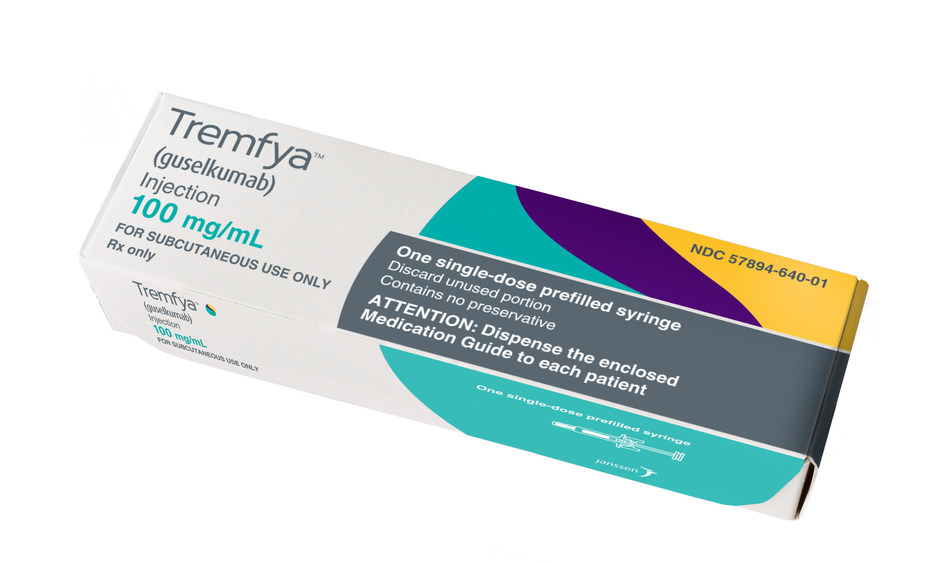 The Janssen division of Johnson & Johnson (NYSE:JNJ) has announced that its selective IL-23 inhibitor Tremfya (guselkumab) led to joint symptom improvement and skin clearance in the majority of patients with an inadequate response to tumor necrosis factor inhibitors (TNFi’s).
The Janssen division of Johnson & Johnson (NYSE:JNJ) has announced that its selective IL-23 inhibitor Tremfya (guselkumab) led to joint symptom improvement and skin clearance in the majority of patients with an inadequate response to tumor necrosis factor inhibitors (TNFi’s).
After 24 weeks of treatment, 44.4% of patients who received Tremfya had at least a 20% improvement in joint symptoms using the American College of Rheumatology’s ACR20 scale, which requires at least a 20% improvement in several arthritis measures. Some 19.9% of placebo recipients had the same degree of improvement.
At one year, 57.7% achieved more than 20% improvement in joint symptoms using the American College of Rheumatology’s ACR20 scale, which requires at least a 20% improvement in several arthritis measures. Some 53.4% of the psoriatic arthritis patients had complete skin clearance.
“We’re basically continuing to develop the body of evidence to help physicians make decisions about how best to use Tremfya,” said Dr. Alyssa Johnsen, VP and rheumatology disease area leader at Janssen.
Tremfya is currently FDA-indicated for moderate-to-severe plaque psoriasis patients eligible for systemic therapy and patients with active psoriatic arthritis.

Tremfya (guselkumab) won FDA approval for adult patients with active psoriatic arthritis in 2020.
The recent COSMOS Phase 3b study is unique in its focus on TNFi non-responders, Johnsen said. “While the DISCOVER [1 and 2] studies studied patients who had been on TNF inhibitors in the past, COSMOS is a dedicated study specifically looking at this patient population who either had had an inadequate [TNFi] response based on efficacy or had intolerance,” Johnsen said. “This is really important because these patients have historically been harder to treat.”
While TNF inhibitors have helped transform the treatment landscape for patients with psoriasis and psoriatic arthritis, “there still are patients who just don’t achieve sufficient responses,” Johnsen said. “And it’s really important for physicians to understand how a new mechanism of action can actually work in this harder-to-treat population.”
A related challenge involves managing symptoms of psoriatic arthritis patients who have a loss of response to TNF blockers over time.
Psoriatic arthritis is a chronic inflammatory disease that can significantly impact patients’ quality of life. At EULAR’s European Congress of Rheumatology 2021, Janssen shared data indicating that active psoriatic arthritis frequently leads to loss of work productivity while negatively affecting activity outside of work.
In the separate DISCOVER 2 trial, psoriasis patients receiving Tremfya demonstrated significant improvements in anxiety, depression, fatigue and other measures.
But the positive data from the COSMOS study and other studies related to psoriasis and psoriatic arthritis could lead to continued improvements for many of these patients, Johnsen said. “As physicians get better at treating [psoriasis] patients, the bar gets higher for patients and even what patients would expect for themselves,” she said. “The ultimate goal, I think, for everyone, is ultimately remission, and that’s a very high bar.”
Biologics such as Tremfya have already had a considerable impact on the treatment of psoriasis. TNF inhibitors have “made a dramatic difference in patients’ lives — to have something that could provide a meaningful change in their joint symptoms, swelling and in their progression to joint damage,” Johnsen said. “And there also have been significant benefits with respect to skin disease.”
Filed Under: clinical trials, Drug Discovery, Rheumatology



